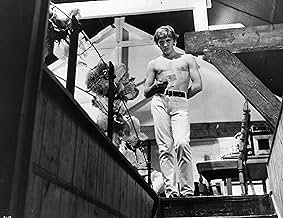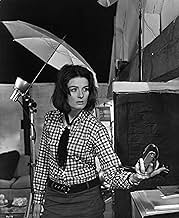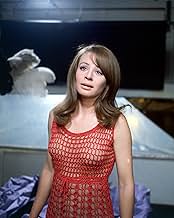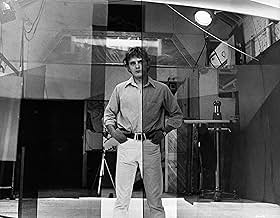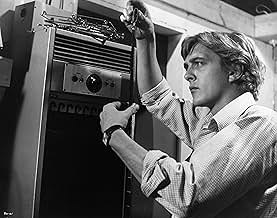Um fotógrafo de Londres encontra algo suspeitoso nas fotografías duma misteriosa mulher num parque.Um fotógrafo de Londres encontra algo suspeitoso nas fotografías duma misteriosa mulher num parque.Um fotógrafo de Londres encontra algo suspeitoso nas fotografías duma misteriosa mulher num parque.
- Direção
- Roteiristas
- Artistas
- Indicado a 2 Oscars
- 8 vitórias e 9 indicações no total
Veruschka von Lehndorff
- Verushka
- (as Verushka)
Jeff Beck
- Self - The Yardbirds
- (não creditado)
Roy Beck
- Boy dancing In Ricki Tick Club
- (não creditado)
Charlie Bird
- Homeless Man
- (não creditado)
Susan Brodrick
- Antique shop owner
- (não creditado)
Robin Burns
- Homeless Man
- (não creditado)
Tsai Chin
- Thomas's receptionist
- (não creditado)
Julio Cortázar
- Homeless Man
- (não creditado)
Chris Dreja
- Self - The Yardbirds
- (não creditado)
Avaliações em destaque
I realize that this is a cinema classic, taught in cinema courses everywhere. And I recognize that there is some pretty remarkable stuff here. But some of it I found very off-putting.
First, to the good: the cinematography is almost constantly remarkable. The way scenes are framed, the constant variation of camera angles, the switches between close and far, etc. I almost would have preferred this without sound. There was so much of interest to watch.
There was little of interest to hear, however. The dialogue is inane. And the protagonist is an egotistical, selfish, thoroughly repugnant excuse for a man. Maybe he's alienated from his world. Why would I care? He does everything to demonstrate that he cares about nothing and no one but himself.
Just past the midpoint of this movie, it starts to become interesting when the photographer detects something in the background of one of his photos. When it turns out a man was murdered, he wants to know more. But why? He's never shown any interest in anything other than himself up until then?
And, finally, he seems to forget about it all.
Watch this once for the amazing camerawork. But as for the plot, the characters, and the rest, don't expect to be engaged. I certainly wasn't.
First, to the good: the cinematography is almost constantly remarkable. The way scenes are framed, the constant variation of camera angles, the switches between close and far, etc. I almost would have preferred this without sound. There was so much of interest to watch.
There was little of interest to hear, however. The dialogue is inane. And the protagonist is an egotistical, selfish, thoroughly repugnant excuse for a man. Maybe he's alienated from his world. Why would I care? He does everything to demonstrate that he cares about nothing and no one but himself.
Just past the midpoint of this movie, it starts to become interesting when the photographer detects something in the background of one of his photos. When it turns out a man was murdered, he wants to know more. But why? He's never shown any interest in anything other than himself up until then?
And, finally, he seems to forget about it all.
Watch this once for the amazing camerawork. But as for the plot, the characters, and the rest, don't expect to be engaged. I certainly wasn't.
Some interpret this existential film to mean that human reality is defined in the context of the group, not the individual. Hence, in the film, to Thomas (David Hemmings), the murder did occur. But, the murder's "reality" is objective only if Thomas can verify it through someone else's experience. Otherwise, Thomas' observed event is subjective and problematic. Each individual thus sees through a glass darkly ... even when the glass is an "objective" camera lens. Ironically, the same could be said for Antonioni.
This film came out only three years after the JFK assassination. I find it hard to believe that that event did not play into this film to some extent. There are all kinds of references to the assassination: the grassy area and picket fence; photographic evidence of a "badge man" character with gun hiding in the bushes; the subsequently developed pictures having been presumably stolen or altered as part of some conspiracy. It's almost as if Thomas and his camera represent the Zapruder film component of the assassination. Indeed, the causal "reality" of the JFK murder was, and still is, to some extent a function of human perception, derived from an interpretation of what the camera sees.
"Blowup" is unlike most films. There are long takes, with minimal editing. This gives the film a slow, meandering feel. Dialogue is minimal. Natural sounds override music, throughout. And like other Antonioni films, this one is mostly visual. The cinematography is striking.
Another characteristic is that the film is not plot intensive. Nor are the characters sympathetic. Thomas is not at all likable. And other characters are mere mannequins. I question whether Antonioni needed two hours to convey his message. More of a plot might have reduced the need for so much seemingly irrelevant filler.
"Blowup" is mostly for viewers who like unconventional, arty films that impart abstruse philosophical "meaning". The film is therefore aimed at people who like to think and ponder.
This film came out only three years after the JFK assassination. I find it hard to believe that that event did not play into this film to some extent. There are all kinds of references to the assassination: the grassy area and picket fence; photographic evidence of a "badge man" character with gun hiding in the bushes; the subsequently developed pictures having been presumably stolen or altered as part of some conspiracy. It's almost as if Thomas and his camera represent the Zapruder film component of the assassination. Indeed, the causal "reality" of the JFK murder was, and still is, to some extent a function of human perception, derived from an interpretation of what the camera sees.
"Blowup" is unlike most films. There are long takes, with minimal editing. This gives the film a slow, meandering feel. Dialogue is minimal. Natural sounds override music, throughout. And like other Antonioni films, this one is mostly visual. The cinematography is striking.
Another characteristic is that the film is not plot intensive. Nor are the characters sympathetic. Thomas is not at all likable. And other characters are mere mannequins. I question whether Antonioni needed two hours to convey his message. More of a plot might have reduced the need for so much seemingly irrelevant filler.
"Blowup" is mostly for viewers who like unconventional, arty films that impart abstruse philosophical "meaning". The film is therefore aimed at people who like to think and ponder.
Antonioni was not a director that worried too much about people completely understanding his films. In fact I'd bet that he actually hoped they didn't understand everything. So I did not find it strange or surprising when after finishing the movie I felt quite confused. But the movie made me think for a very long time, which in my opinion is what a good film should do. There are so many aspects to this film that if you give them a chance and think about them, they will keep you reeling for hours on possible interpretations. The first and probably most important aspect of this film dealt with love. From what I have seen of his films, love is Antonioni's favorite subject. But this love was different than that of past films; it is much more shallow and un-centered. Thomas, the photographer, is surrounded by women, he goes from one to the next without thinking twice, treating them like dogs the entire time. But he can do this and get away with it because he is a famous photographer and can make the women what they all desperately want to be, Beautiful. For The first half of the movie I honestly did not like his character whatsoever. Whereas in the past the director has chosen mainly to explore the ups and downs of married life, or the problems of being hopelessly devoted to one person, he now points the camera at the single, care free, over sexed, youth of the sixties. Half an hour into the movie I found myself wondering what the heart of the film was going to be. We were introduced to Thomas and his world, but there seemed to be no conflict driving the story forward. Then came the quasi-murder mystery. This is what is really interesting and unique about this film in my opinion. Antonioni for a while leads us to believe that the movie is going to turn into some suspense thriller, or murder mystery, but never seems to quite get there. He has all the elements ready to go, but never follows through with them. He introduces this alluring and mysterious woman who is in on the murder and then never brings her back. The murder victim is discovered, but his identity is never revealed, nor a motive given for his murder. Thomas, after a very energetic and exciting photo investigation seems to not really care too much as to what happens with the investigations results, only telling a couple of his friends who couldn't care less. Antonioni seems to have used this whole murder mystery convention as some sort of glue to hold the rest of the real story together. The story of a mindless, beauty obsessed, celebrity idolizing, drug addicted, and violence obsessed culture. Probably my favorite scene in the film is after fighting over the piece of broken guitar with the other fans; Thomas just discards his prize as garbage. Something that kept bugging me was the antique shop. I kept wondering what in the world it had to do with anything in the movie; it stuck out like a sore thumb. But I knew it that there was some major purpose or explanation for its existence in the film, and then it just kind of clicked. Upon his first entry into the Antique store Thomas encounters an angry old man who we eventually find out is not the stores real owner, the true owner is a beautiful young woman who is planning to sell the old place and travel the world in search of something new. All this stuff she owns, the gold of past cultures, is old and useless now. She has a hard time making a living because nobody wants the stuff any longer. Here is where I think Antonioni's major message is hidden: That is the way life is, it moves on constantly, things change, people die, cultures evolve and the only thing that remains in the end is nature itself. Antonioni finishes the film beautifully, Thomas stands alone in a large field of grass, the only thing heard is the wind and the trees, as the camera backs away slowly, he disappears leaving nothing but the grass blowing in the wind, for like all the antiques and all the people that created them in the past, eventually Thomas's life will end and so will the current popular culture in which he takes part. Change is life's only constant.
I would recommend that people who are considering watching this film for the first time not read the following. I don't mention the film's ending, I just believe its far more satisfying to let the films potent details nervously sink into place on their own.
It is not about cameras. It is not about seeing. It is about our perception of our individual world. It throws shadows on the very judgments we build our lives upon. Without mentioning the obvious references to illusion (the mimes, the abstract picture of the corpse, etc.), I offer the following expert signposts Antonioni leaves for us to find.
1) The guitar neck David snatches at the rave-up has value only until he is not being chased for it, whereupon he discards it in the street. The pedestrian who then picks it up sees it only as junk.
2) Dialogue with his model friend at the pot party: DAVID - ` I thought you were in Paris.' THE GIRL - `I am'.
3) Appearances and Disappearance (2 of the many). The Lynn Redgrave character pops up as he arrives at his apartment. His question `How did you find me' is not explained. Later in the story, it is notably odd when David wakes up the following morning after the pot party that there is no one to be seen in the party house. Even the decorations like the clothes hung on the statue the night before have vanished.
4) David teaches the affectations of smoking to the woman. She must create an impression.
5) His painter friend describes his painting. `They don't mean anything to me while I work on them. Its only later that I ascribed something to them. Like this leg.' Whereupon he points out a place in a painting that might be a human leg. When he paints, he is tapping subconscious language, something apart from subjective and objective reality. Its as if Antonioni is offering us an even further vantage point to the events to come, dream reality.
6) The rambling diversion of events shows David's inability to `focus' on working through his mystery.
7) So much is hidden from the viewer. Its almost suggested that the real end to the narrative takes place someplace after the movie has already finished, jarring our sense of story, insinuating an ending we never get to `see'.
8) David announces at one point to his friend, `If only I had more money I'd be all right.'. Meanwhile he drives through the whole movie in his Rolls Royce.
This is a very remarkable film. I was irked by the pacing and the diversions as I watched it, but that was exactly why it all kept coming and coming at me for hours after until finally in bed it all rushed through me like a gorgeous musical event. I know for certain there are many more hidden corners to it, but this is what I got in my first viewing. Just that gut feeling that I missed something, I believe, is exactly where Antonioni was going. You always miss something.
It is not about cameras. It is not about seeing. It is about our perception of our individual world. It throws shadows on the very judgments we build our lives upon. Without mentioning the obvious references to illusion (the mimes, the abstract picture of the corpse, etc.), I offer the following expert signposts Antonioni leaves for us to find.
1) The guitar neck David snatches at the rave-up has value only until he is not being chased for it, whereupon he discards it in the street. The pedestrian who then picks it up sees it only as junk.
2) Dialogue with his model friend at the pot party: DAVID - ` I thought you were in Paris.' THE GIRL - `I am'.
3) Appearances and Disappearance (2 of the many). The Lynn Redgrave character pops up as he arrives at his apartment. His question `How did you find me' is not explained. Later in the story, it is notably odd when David wakes up the following morning after the pot party that there is no one to be seen in the party house. Even the decorations like the clothes hung on the statue the night before have vanished.
4) David teaches the affectations of smoking to the woman. She must create an impression.
5) His painter friend describes his painting. `They don't mean anything to me while I work on them. Its only later that I ascribed something to them. Like this leg.' Whereupon he points out a place in a painting that might be a human leg. When he paints, he is tapping subconscious language, something apart from subjective and objective reality. Its as if Antonioni is offering us an even further vantage point to the events to come, dream reality.
6) The rambling diversion of events shows David's inability to `focus' on working through his mystery.
7) So much is hidden from the viewer. Its almost suggested that the real end to the narrative takes place someplace after the movie has already finished, jarring our sense of story, insinuating an ending we never get to `see'.
8) David announces at one point to his friend, `If only I had more money I'd be all right.'. Meanwhile he drives through the whole movie in his Rolls Royce.
This is a very remarkable film. I was irked by the pacing and the diversions as I watched it, but that was exactly why it all kept coming and coming at me for hours after until finally in bed it all rushed through me like a gorgeous musical event. I know for certain there are many more hidden corners to it, but this is what I got in my first viewing. Just that gut feeling that I missed something, I believe, is exactly where Antonioni was going. You always miss something.
Blow Up is the quintessential 60' s movie with a roster of talented British actors, colourful mod fashions (now back in vogue), dreary post-war London locations and empty streets, groovy music by American composer extraordinaire Herbie Hancock and an Italian director and writer in love with the whole scene. Blow Up is the cinematic equivalent of the TR4 cabriolet, designed by Michelotti and manufactured by Triumph during the same period, and mixes the best of two rather different cultures. The movie offers the right amount of nudity, sensuality and perversion without offending the prude status quo of swinging Olde England. David Hemmings plays a character who is by all accounts snobbish, homophobic, prejudiced, rude and macho. This pseudo thriller/whodunit unwinds rather slowly and with little dialogue and, I think, is just an excuse for Antonioni to show how weird the English were. A must see flick for the ones nostalgic or who missed the 60' s completely.
Você sabia?
- CuriosidadesThe film contains a rare performance of The Yardbirds during the period when Jimmy Page and Jeff Beck were both in the band. Jeff Beck would leave a few months later.
- Erros de gravaçãoWhen Thomas is frolicking with the two girls on the purple paper backdrop in the studio, two crew members, including a camera operator, can be seen just sitting there in the top right side of the frame.
- Versões alternativasSome of the music was rescored for the Warner DVD release, namely the latter part of the opening title music. The VHS releases' music remain intact.
- ConexõesFeatured in Film Review: How I Learned to Live with Being a Star (1967)
- Trilhas sonorasMain Title (Blow-Up)
Written and Performed by Herbie Hancock
Principais escolhas
Faça login para avaliar e ver a lista de recomendações personalizadas
- How long is Blow-Up?Fornecido pela Alexa
Detalhes
- Data de lançamento
- Países de origem
- Central de atendimento oficial
- Idioma
- Também conhecido como
- Deseo de una mañana de verano
- Locações de filme
- Maryon Park, Woolwich Road, Charlton, Londres, Inglaterra, Reino Unido(scenes where Thomas first photographs Jane and where mime artists play tennis at the end)
- Empresas de produção
- Consulte mais créditos da empresa na IMDbPro
Bilheteria
- Orçamento
- US$ 1.800.000 (estimativa)
- Faturamento bruto mundial
- US$ 38.575
- Tempo de duração
- 1 h 51 min(111 min)
- Mixagem de som
- Proporção
- 1.85 : 1
Contribua para esta página
Sugerir uma alteração ou adicionar conteúdo ausente



